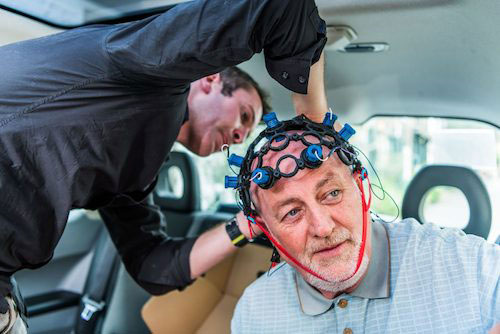Electric Vehicles reduce stress behind the wheel
Brain monitoring technology, used for the first time on drivers, found that electric vehicles make drivers calmer, happier and more focused.
- A study by LEVC (London EV Company) shows that electrically driven vehicles don’t just cut drivers’ fuel costs and help improve air quality – but can also reduce stress behind the wheel
- For the first time, brain activity of cabbies in both electric and diesel taxis was monitored in a scientific test
- Drivers of the new electric taxi (TX) were found to be more focussed, calmer and happier versus diesel models
- Reducing stress is a key focus of Mental Health Awareness Week (14-20 May), hosted by the Mental Health Foundation
- As cities place increasing importance on zero emission capable commercial vehicles to improve urban air quality, LEVC’s study potentially has wider positive mental health benefits for all professional drivers
A new study undertaken by LEVC has shown that the quieter driving environment of an electrically-driven vehicle can have significant mental health benefits. The work, in conjunction with academics from the University of York, has been released during Mental Health Awareness Week (14-20 May) which is focused on stress and stress reduction, and shows that moving from driving diesel to electric vehicles improves mental well-being for commercial vehicle drivers.
In a world first, LEVC commissioned an experiment to monitor mental activity – among a host of other physical factors – of drivers in both the new electrically-driven taxi and previous diesel model to find out if the quiet cabin of the state-of-the-art electric vehicle had an effect on the wellbeing of hard-working taxi drivers.
The test was designed and executed by acoustics expert Dr Duncan Williams of the University of York and took place in central London with four professional cabbies taking to the wheel of both vehicles and undertaking a series of trial drives.
An electroencephalogram, often referred to as a ‘brain cap’, was placed on the head of each driver. Electrodes within the cap monitored brain activity over a set route through the capital, giving previously unseen insight into the differing mental states between drivers of electric and diesel vehicles. Heart rate and audio readings were also taken too.
Driving the electric taxi, cabbies were found to be:
More focussed than when driving the diesel vehicle
- Higher levels of beta brain wave activity were recorded by drivers in the electric vehicle, which indicates higher levels of active concentration. In short, while driving the electric taxi, drivers were freed up get on with driving
- This was particularly noticeable when vehicles are waiting at traffic lights – a common situation for the London cabbie
Calmer than when driving the diesel vehicle
- Heart rate was consistently less variable in the electric taxi than the diesel taxi, indicating greater mental calmness
- The electric taxi was a less noisy working environment for the drivers with around 5dB less overall amplitude, and an increased dynamic range in comparison to recordings from the diesel taxi.
Happier than when driving the diesel vehicle
- Additional driver survey data showed that the largest improvement over the diesel taxi reported by the drivers was increased happiness
- This was followed by reduced stress and less distraction in the electric taxi
All the drivers who took part in the study had already clocked up many miles in the electric TX taxi and were familiar with its controls and driving behaviour.









